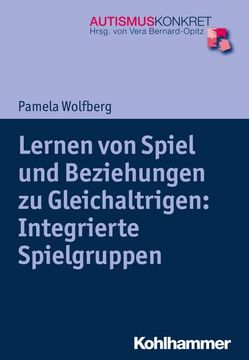Lernen Von Spiel Und Beziehungen Zu Gleichaltrigen: Integrierte Spielgruppen (en Alemán)
Reseña del libro "Lernen Von Spiel Und Beziehungen Zu Gleichaltrigen: Integrierte Spielgruppen (en Alemán)"
English summary: Children on the autism spectrum are a high risk for being socially excluded by peers and missing out on essential play experiences. To address these challenges, Learning to Play and Socialize with Peers: Integrated Play Groups Model contributes to a body of work focused on the Integrated Play Groups (IPG) model. The IPG model is designed to promote socialization, communication, play and imagination in children with autism while building relationships with typical peers and siblings through mutually engaging experiences. Written at an introductory level, this book is geared to beginning specialists (educators, therapists, practitioners) and non-specialists (parents, family members, care-providers) interested in learning the basic principles and practices of the IPG model. Woven throughout this book are several common themes reflected in the IPG model. First, the IPG model emphasizes the essential role of play, not only for advancing children=s development and socio-cultural participation, but also as a fundamental human right. Second, there is an appreciation of individual differences and diversity by crafting unique IPG programs that are tailored to the child=s age, abilities, and special interests and responsive to family culture, language, values, and preferences. Third, the IPG model comprises both effective and socially validated practices & practices that are grounded in an empirical evidence-base as well as deemed beneficial by key stakeholders (i.e., specialists, non-specialists, as well as the children with autism and their peers. Finally, as opposed to operating in isolation, the IPG model occurs in conjunction with other compatible efforts to enhance children=s full participation in social, cultural and quality of life experiences. To illustrate the conceptualization and actualization of the IPG model, this book includes first-hand accounts of lived experiences with children collected over many years. Chapter 1 begins with the conception of the IPG model, including its theoretical and scientific basis, and how it has evolved in a rapidly growing field. Chapter 2 highlights the critical importance of inclusive socialization and play and the distinct challenges for children across the autism spectrum in terms of their development and cultural participation. The application of the IPG model is detailed in Chapter 3 using case examples to demonstrate methods for designing and implementing practices within diverse natural contexts. Chapter 4 gives a summary and conclusion, highlighting future directions for research and practice. The text also includes a variety of tools and resources that readers may find useful for helping children with autism learn how to play and socialize with peers in inclusive settings. German description: Kinder im Autismus-Spektrum haben ein hohes Risiko, von Gleichaltrigen ausgeschlossen zu werden und dadurch wichtige Erfahrungen beim Spielen zu verpassen. Um diesen Herausforderungen zu begegnen, wurde das "Integrated Play Groups"-Modell (IPG) entwickelt, das die Sozialisation, die Kommunikation, das Spiel und die Vorstellungskraft von Kindern mit Autismus fordern soll. Es umfasst sowohl effektive als auch sozial validierte Ubungen. Um die Begrifflichkeit und die Umsetzung des IPG-Modells zu verdeutlichen, enthalt dieses Buch Berichte von Erfahrungen mit Kindern, die uber viele Jahre gesammelt wurden. Fallbeispiele demonstrieren die Methoden fur die Konzipierung und die Durchfuhrung von Ubungen in diversen naturlichen Kontexten. Das Buch enthalt ausserdem eine Anzahl von nutzlichen Arbeitshilfen und Quellen, um den Betroffenen zu zeigen, wie sie lernen konnen, mit Gleichaltrigen in einem inklusiven Milieu zu spielen und Kontakte zu ihnen zu knupfen.

